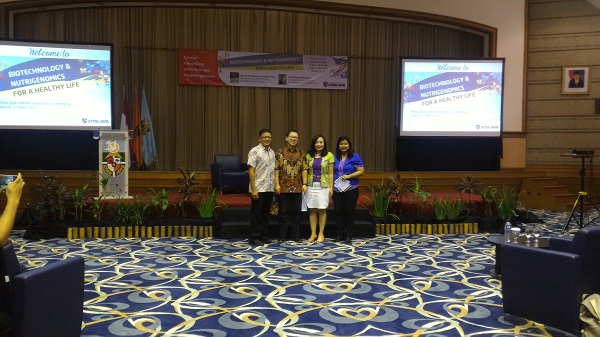
ASK
ME

REGISTER
NOW
Jakarta, 3rd April 2017 – Faculty of Technobiology of Atma Jaya Catholic University of Indonesia held a seminar of "Biotechnology & Nutrigenomics For a Healthy Life" on Saturday (1/4) in Yustinus Building 15th floor. This event consists of two sessions, which are discussion about applications and functions of technobiology with Antonius Suwanto And Stephen Indrayana.
The first session was delivered by Antonius Suwanto who talked about the functions of technobiology in agriculture and food. "We are genes that are modified by the results of our parents’ reproduction. Therefore, every human being is diverse and even has different fingerprints," explained Antonius. Modified gene can also be applied to vegetables and plants that human consume. Before 1500, humans had not known vegetables such as broccoli or cabbage. Vegetables and new plants begin to be discovered because of the results of hybridization.
Science and Technology (Ilmu Pengetahuan dan Teknologi/IPTEK) has been developing since people understand Deoxyribo Nucleic Acid (DNA). "Humans started to understand DNA in the 60s," said Antonius. Starting from that, toxins that can eradicate pests in vegetables which are not harmful to humans who consume them were found. From the toxins, vegetables have better quality.

The Atmosphere of the closing of Biotechnology and Nutigenomics For A Healthy Life Seminar
In the second session, Stefanus Indrayana discussed topics on social issues related to poverty and malnutrition. There needs to be a focus on how to provide food with good quality. Currently, major developments about what food to eat and how to eat those food have occurred in urban areas. "Human’s need for eggs, fish, and meat have increased," says Stephen. Owing to that, problems like poverty and malnutrition rises.
Approximately 165 million people in Indonesia suffer from malnutrition that can cause obstacles to brain development, physical weakness, and weak enzymes so they are susceptible to disease. In addition, problems such as stunting, malnourished pregnant women which affect the fetus, iodine and iron deficiency still often occur. To overcome this problem, the United Nations (UN) holds social movements aimed at resolving the problem of social inequality such as food shortage, hunger, poverty without any people left behind. The action was carried out by 193 countries and has been going on since 2015 to 2030.
